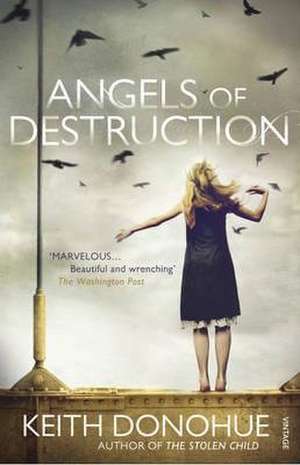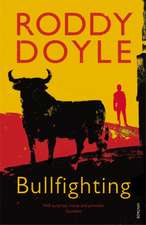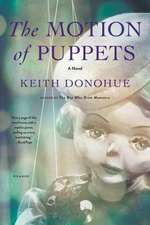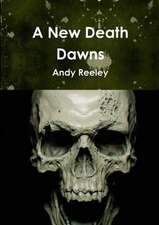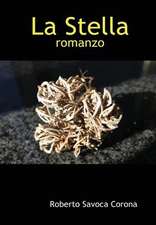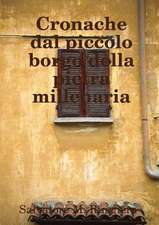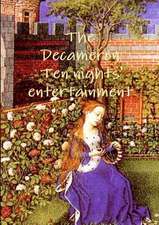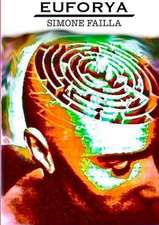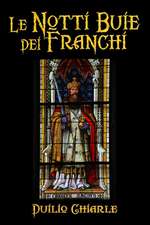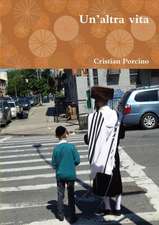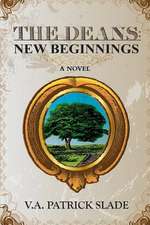Angels of Destruction
Autor Keith Donohueen Limba Engleză Paperback – 6 oct 2010
| Toate formatele și edițiile | Preț | Express |
|---|---|---|
| Paperback (2) | 44.34 lei 22-33 zile | |
| Vintage Publishing – 6 oct 2010 | 44.34 lei 22-33 zile | |
| Three Rivers Press (CA) – 30 sep 2009 | 108.50 lei 3-5 săpt. |
Preț: 44.34 lei
Preț vechi: 51.78 lei
-14% Nou
Puncte Express: 67
Preț estimativ în valută:
8.48€ • 8.88$ • 7.04£
8.48€ • 8.88$ • 7.04£
Carte disponibilă
Livrare economică 21 martie-01 aprilie
Preluare comenzi: 021 569.72.76
Specificații
ISBN-13: 9780099526773
ISBN-10: 0099526778
Pagini: 368
Dimensiuni: 131 x 197 x 23 mm
Greutate: 0.26 kg
Editura: Vintage Publishing
Locul publicării:United Kingdom
ISBN-10: 0099526778
Pagini: 368
Dimensiuni: 131 x 197 x 23 mm
Greutate: 0.26 kg
Editura: Vintage Publishing
Locul publicării:United Kingdom
Recenzii
Praise for ANGELS OF DESTRUCTION
“Norah’s unexplained origins form the enigmatic core of this story . . . the novel movingly illustrates the quest for connection hardwired into every human heart.”
—Publishers Weekly
“[A] strange and finely written novel. Donohue has a talent for using small details to draw his characters, and the result is a dark and unsettling story that takes hold of the reader.”
—Library Journal
“Fused with spectral imagery and magnetic characters, Donohue’s ethereal foray into the unexpected consequences of love, impenetrable depths of loss, and infinite possibilities of faith is a chilling yet affirmative experience.”
—Booklist
“[A] beguiling tale of those who love well, but not wisely, unspooling like a poem embroidered on the heart — ornate, painful and true. . . . While some readers might liken Donohue’s penchant for mystical realism to that of novelist Alice Hoffman, any sweeping comparisons shortchange both writers, whose immense gifts bear separate and distinct literary imprimaturs. Still, he shares Hoffman’s uncanny ear for capturing the libretto of childhood . . .”
—BookPage
“Angels of Destruction is replete with ghostly presences, harbingers of doom, angels good and bad. Surveys indicate that more than half of us believe in angels, so this otherworldly novel should find a ready audience.”
—Boston Globe
“Donohue never quite reveals the mystery at the heart of Norah's sudden appearance, and that makes Angels of Destruction all the more satisfying and, yes, believable. Literary and historical clues are scattered throughout: references to the atomic bomb; a spectral man in fedora and camel-hair coat who pursues Norah and haunts Margaret; and an oblique nod to the Liber Juratus, a 14th-century manuscript containing a roll call of angels. The talisman that both Norah and Una pass on to those they love is a child's teacup with a chip in it, which invokes Auden's great poem As I Walked Out One Evening: ‘The crack in the tea-cup opens/A lane to the land of the dead.’
Angels of Destruction doesn't shrink from the tragedies and inevitable separations that dog us. The book's coda is beautiful and wrenching, yet still leaves its protagonists and readers open to the possibility that the miraculous, once glimpsed, might recur. ‘Love is not consolation, it is light,’ wrote Simone Weil. In these bleak times, we can thank Donohue for opening a door in a darkened room.”
—Washington Post
Fans of the author’s debut novel, The Stolen Child, will enjoy the same balancing act between reality and fantasy. . . . Donohue marries some fantastical themes with an unadorned style of writing that should appeal to realists and fantasy fans alike.”
—Chicago Sun-Times
“With ‘Angels,’ Donohue delivers a magical tale of love and redemption that is as wonderfully written as it is captivating. . . . Donohue is delightfully descriptive in his writing. His word choices are carefully considered . . . and his pacing rivets you to page after page. . . . ‘Angels’ earns its wings.”
—Pittsburgh Post-Gazette
“Angels of Destruction is charming, suspenseful, and even touching.”
—New York Daily News
Praise for The Stolen Child
“A captivating tale . . . poignant and beautifully told.”
—USA Today
“A wonderful, fantasy-laden debut . . . so spare and unsentimental that it’s impossible not to be moved.”
—Newsweek
“Utterly absorbing . . . a luminous and thrilling novel about our humanity.”
—Washington Post
“The book’s emotional impact is as fierce as the imagination behind it. The result is magical.”
—People
“An ingenious, spirited allegory for adolescent angst, aging, the purpose of art.”
—Entertainment Weekly
“Unusual and engaging . . . puts flesh to the bones of old fears.”
—Miami Sun-Herald
From the Hardcover edition.
“Norah’s unexplained origins form the enigmatic core of this story . . . the novel movingly illustrates the quest for connection hardwired into every human heart.”
—Publishers Weekly
“[A] strange and finely written novel. Donohue has a talent for using small details to draw his characters, and the result is a dark and unsettling story that takes hold of the reader.”
—Library Journal
“Fused with spectral imagery and magnetic characters, Donohue’s ethereal foray into the unexpected consequences of love, impenetrable depths of loss, and infinite possibilities of faith is a chilling yet affirmative experience.”
—Booklist
“[A] beguiling tale of those who love well, but not wisely, unspooling like a poem embroidered on the heart — ornate, painful and true. . . . While some readers might liken Donohue’s penchant for mystical realism to that of novelist Alice Hoffman, any sweeping comparisons shortchange both writers, whose immense gifts bear separate and distinct literary imprimaturs. Still, he shares Hoffman’s uncanny ear for capturing the libretto of childhood . . .”
—BookPage
“Angels of Destruction is replete with ghostly presences, harbingers of doom, angels good and bad. Surveys indicate that more than half of us believe in angels, so this otherworldly novel should find a ready audience.”
—Boston Globe
“Donohue never quite reveals the mystery at the heart of Norah's sudden appearance, and that makes Angels of Destruction all the more satisfying and, yes, believable. Literary and historical clues are scattered throughout: references to the atomic bomb; a spectral man in fedora and camel-hair coat who pursues Norah and haunts Margaret; and an oblique nod to the Liber Juratus, a 14th-century manuscript containing a roll call of angels. The talisman that both Norah and Una pass on to those they love is a child's teacup with a chip in it, which invokes Auden's great poem As I Walked Out One Evening: ‘The crack in the tea-cup opens/A lane to the land of the dead.’
Angels of Destruction doesn't shrink from the tragedies and inevitable separations that dog us. The book's coda is beautiful and wrenching, yet still leaves its protagonists and readers open to the possibility that the miraculous, once glimpsed, might recur. ‘Love is not consolation, it is light,’ wrote Simone Weil. In these bleak times, we can thank Donohue for opening a door in a darkened room.”
—Washington Post
Fans of the author’s debut novel, The Stolen Child, will enjoy the same balancing act between reality and fantasy. . . . Donohue marries some fantastical themes with an unadorned style of writing that should appeal to realists and fantasy fans alike.”
—Chicago Sun-Times
“With ‘Angels,’ Donohue delivers a magical tale of love and redemption that is as wonderfully written as it is captivating. . . . Donohue is delightfully descriptive in his writing. His word choices are carefully considered . . . and his pacing rivets you to page after page. . . . ‘Angels’ earns its wings.”
—Pittsburgh Post-Gazette
“Angels of Destruction is charming, suspenseful, and even touching.”
—New York Daily News
Praise for The Stolen Child
“A captivating tale . . . poignant and beautifully told.”
—USA Today
“A wonderful, fantasy-laden debut . . . so spare and unsentimental that it’s impossible not to be moved.”
—Newsweek
“Utterly absorbing . . . a luminous and thrilling novel about our humanity.”
—Washington Post
“The book’s emotional impact is as fierce as the imagination behind it. The result is magical.”
—People
“An ingenious, spirited allegory for adolescent angst, aging, the purpose of art.”
—Entertainment Weekly
“Unusual and engaging . . . puts flesh to the bones of old fears.”
—Miami Sun-Herald
From the Hardcover edition.
Notă biografică
KEITH DONOHUE’s first novel, The Stolen Child, was a New York Times bestseller. For many years a ghostwriter, he now works at a federal governmental agency in Washington, D.C. He has published short stories and literary criticism, most recently an introduction to the collected works of Flann O’Brien. Donohue holds a Ph.D. in English from the Catholic University of America.
From the Hardcover edition.
From the Hardcover edition.
Descriere
Descriere de la o altă ediție sau format:
Fused with spectral imagery and magnetic characters, Donohue's ethereal foray into the unexpected consequences of love, impenetrable depths of loss, and infinite possibilities of faith is a chilling yet affirmative experience.--"Booklist."
Fused with spectral imagery and magnetic characters, Donohue's ethereal foray into the unexpected consequences of love, impenetrable depths of loss, and infinite possibilities of faith is a chilling yet affirmative experience.--"Booklist."
